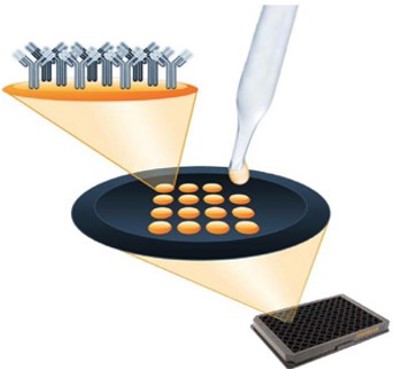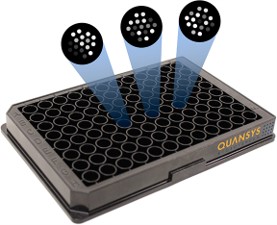MICROVUE™ Complement Multiplex
ELISA based chemiluminescent multiplex for complement system analytes.
Product Specifications
| Citations | 16 |
|---|---|
| Specimen | Plasma, Serum |
| LLOQ | Varies |
| ULOQ | Varies |
| Assay Time | 3.5 Hours |
| Cross Reactivity | Rhesus Monkey, Cynomolgus Monkey (cross reactivity observed in some analytes. See specifications for details) |
Ordering Information
Intended Use: For research use only in the United States. Not for use in diagnostic procedures
| Catalog Number | View Ordering Info tab for product options |
|---|---|
| Catalog Number (xUS) | View Ordering Info tab for product options |
| Size | 96 wells/test |
| Price (USD) | View Ordering Info tab for pricing |
| Price (EURO) | View Ordering Info tab for pricing |
Contact us
| US Phone | +1 (858) 552 1100 |
|---|---|
| EU Phone | +353 (91) 412 474 |
| US Email | contact-us@quidelortho.com |
| EU Email | contact-emea@quidelortho.com |
- Product description
- Ordering Info
- Specifications
- Citations
- Certificate of Analysis
Product description
An ELISA based assay designed to generate maximum data
The MicroVue Complement Multiplex is an ELISA based platform that allows for the measurement of up to 10 different complement system proteins. QuidelOrtho offers the following assay options (see the Ordering tab for more information):
How it works
ELISA within ELISA
- Capture antibody is applied to 350-500 μm spots to bind target proteins.
- Robotic liquid handlers deposit 20-50 nL of print diluent.
- Static 96 well plate specially created to prevent inter-well signal loss.
Analyte Detection
Signal from individual spots is generated via standard biotin and streptavidin-HRP complexing. Chemiluminescent signal detection and intensity is then used to determine presence and quantity of the specific analytes.
For more information, view the MicroVue Complement Mulitplex brochure for full product specifications, performance review, technology overview, and more.
View our MicroVue Complement Multiplex advantages flyer for how the platform increase laboratory productivity.


Available analytes
| Panel 1* | Panel 2* |
|---|---|
| Ba | C1q |
| Bb | C2 intact |
| C2 intact | C3 intact |
| C3a | C3 intact |
| C3d | C5 intact |
| C4a | Factor D |
| C4d | Factor P |
| C5a | - |
| sC5b-9 | - |
| Factor D | - |
| Factor H | - |
| Factor I | - |
Why 2 Panels?
Complement proteins are found at different concentrations in the blood. Panel 1 analytes require a lower dilution factor (1:100) than those in Panel 2 (1:1000) for the multiplex to perform properly.
- C2 Intact and Factor D can be utilized within both panels.
- All other analytes must be utilized within their respective panels.
Compatability
A limited selection of analytes are not compatible for Panel 1
- C3a is not compatible with C3d.
- C4a is not compatible with C4d.
All Panel 2 analytes are compatible
*This is a comprehensive list of all analytes available for customized panels. See ordering info tab for specific analytes included in each stocked panel.
Ordering info
Available analytes
| Panel 1 | Ba, Bb, C2 Intact, C3a, C3d, C4a, C5a, sC5b-9, Factor D, Factor H, Factor I |
| Panel 2 | C1q, C2 Intact, C3 Intact, C4 Intact, C5 Intact, Factor D, Factor P |
| Why 2 Panels? | Complement proteins are found at different concentrations in the blood. Panel 1 analytes require a lower dilution factor (1:100) than those in Panel 2 (1:1000) for the multiplex to perform properly. C2 Intact and Factor D can be utilized within both panels. |
In-stock kits
| CAT # | Description | Price (U.S. List) | Price (Euro) | Analytes |
|---|---|---|---|---|
| A900 | Complement Multiplex – Panel 1 | $5,990 | €5,470 | Ba, Bb, C3a, C4a, C5a, sC5b-9, FH, FI |
| A901 | Complement Multiplex – Panel 1 Focused | $4,115 | €3,760 | Bb, C3a, C4a, C5a, sC5b-9 |
| A916 | Complement Multiplex – Panel 2 | $5,415 | €4,940 | C1q, C2, C3, C4, C5, FD, FP |
| A917 | Complement Multiplex – Panel 2 Focused | $3,290 | €3,005 | C1q, C3, C4, C5 |
Customized kits (a minium of 5 kits must be ordered)
Panel 1 - Customized Kits
| CAT # | Description | Price (U.S. List) | Price (Euro) | Analytes |
|---|---|---|---|---|
| A903 | Custom 3-plex | $2,475 | €2,255 | Select from combinations of all Panel 1 analytes (see above).
Compatibility A limited selection of analytes are not compatible for Panel 1 • C3a is not compatible with C3d • C4a is not compatible with C4d |
| A904 | Custom 4-plex | $3,290 | €3,005 | |
| A905 | Custom 5-plex | $4,115 | €3,760 | |
| A906 | Custom 6-plex | $4,790 | €4,380 | |
| A907 | Custom 7-plex | $5,415 | €4,940 | |
| A908 | Custom 8-plex | $5,990 | €5,470 | |
| A909 | Custom 9-plex | $6,520 | €5,955 | |
| A910 | Custom 10-plex | $6,990 | €6,385 |
Panel 2 - Customized Kits
| CAT # | Description | Price (U.S. List) | Price(Euro) | Analytes |
|---|---|---|---|---|
| A918 | Custom 3-plex | $2,475 | €2,255 | Select from combinations of all Panel 2 analytes (see above). All Panel 2 analytes are compatible. |
| A919 | Custom 4-plex | $3,290 | €3,005 | |
| A920 | Custom 5-plex | $4,115 | €3,759 | |
| A921 | Custom 6-plex | $4,790 | €4,380 |
Specifications
| Description | ELISA based chemiluminescent multiplex for complement sytsem analytes. |
|---|---|
| Size | 96 wells/test |
| Form | ELISA |
| Specimen | Human: Plasma, Serum |
| Limit of Detection (LOD) | Varies: Refer to Product Instructions for individual analyte performance |
| Lower Limit of Quantitation (LLOQ) | Varies: Refer to Product Instructions for individual analyte performance |
| Upper Limit of Quantitation (ULOQ) | Varies: Refer to Product Instructions for individual analyte performance |
| Intra Assay | Varies: Refer to Product Instructions for individual analyte performance |
| Inter Assay | Varies: Refer to Product Instructions for individual analyte performance |
| Standards | 6 |
| Controls | 2 |
| Assay Time | 3.5 Hours |
| Cross Reactivity | Cynomolgus Monkey: CSF, Serum, Vitreous Humor. (Analytes in panel 1 and panel 2 required various sample dilutions. C2, C4 and C4a required higher dilutions versus the other analytes. C1q, C3, C3a, C5a and factor I were not detected) |
| Storage | 2°C to 8°C until kit expiration |
| Background | The Complement System consists of more than 40 fluid and membrane-bound proteins and protein fragments organized into three primary pathways: Classical, Alternative, and Lectin . By a series of specific activation steps via either the classical, alternative, or the lectin pathway, the complement proteins mediate a set of activities ranging from the initiation of inflammation, clearance of immune complexes, disruption of cell membranes, and regulation of the immune response. Deficiencies in the complement cascade can predispose individuals to infection through ineffective opsonization or defects in the ability to lyse invading pathogens. Besides its essential role in maintaining health, the importance of the complement system in medicine lies in the fact that many acute and chronic diseases are associated with abnormalities in its function. Accordingly, quantitative analysis of different complement proteins and their activation by-products are of great practical importance in medical research. There are numerous immunological methods for complement testing, including individual protein ELISA-based kits measuring complement cleavage products as markers of complement activation. However, the ability to measure multiple complement proteins in an individual sample constitutes a major step forward in research based tools. |
Citations
| Title | Year | Applications | Sample Species | Sample | Sample Details |
|---|---|---|---|---|---|
| 2024 | Multiplex |
Human |
Serum |
Multiple Sclerosis |
|
| 2024 | ELISA |
Cell Culture |
THP-1 Cells |
Age-Related Macular Degeneration |
|
|
Impact of complement activation on clinical outcomes in multiple sclerosis. |
2021 | ELISA |
Human |
Plasma |
Multiple Sclerosis |
| 2021 | ELISA |
Human |
Peripheral blood mononuclear cells |
||
|
Profiling Complement System Components in Primary CNS Vasculitis. |
2021 | ELISA |
Human |
CSF |
Primary CNS Vasculitis |
|
Profiling Complement System Components in Primary CNS Vasculitis. |
2021 | ELISA |
Human |
Serum |
Primary CNS Vasculitis |
| 2021 | ELISA |
Human |
Serum |
MOGAD |
|
|
Complement activation profiles in anti-acetylcholine receptor positive myasthenia gravis. |
2023 | ELISA |
Human |
Plasma |
Myasthenia gravis |
| 2023 | ELISA |
Human |
Plasma, Serum |
Thrombotic Microangiopathy |
|
| 2023 | ELISA |
Human |
Plasma |
||
|
Complement Activation Is Associated With Disease Severity in Multiple Sclerosis. |
2024 | ELISA |
Human |
Plasma |
Multiple Sclerosis |
|
Complement Activation Is Associated With Disease Severity in Multiple Sclerosis |
2024 | ELISA |
Human |
CSF |
Multiple sclerosis |
| 2024 | ELISA |
Human |
Plasma |
Renal Cancer |
|
| 2021 | ELISA |
Human |
Plasma |
Multisystem inflammatory syndrome in children |
|
| 2021 | ELISA |
Human |
Plasma |
COVID-19 |
|
| 2023 | ELISA |
Human |
Plasma |
||
| 2024 | ELISA |
Human |
Plasma |
Renal Cancer |
|
| 2024 | Multiplex |
Human |
Serum |
Multiple Sclerosis |
|
|
Complement Activation Is Associated With Disease Severity in Multiple Sclerosis |
2024 | ELISA |
Human |
Plasma |
Multiple Sclerosis |
| 2024 | ELISA |
Cell Culture |
THP-1 Cells |
Age-Related Macular Degeneration |
|
|
Complement Activation Is Associated With Disease Severity in Multiple Sclerosis. |
2024 | ELISA |
Human |
CSF |
Multiple Sclerosis |
Certificate of Analysis

